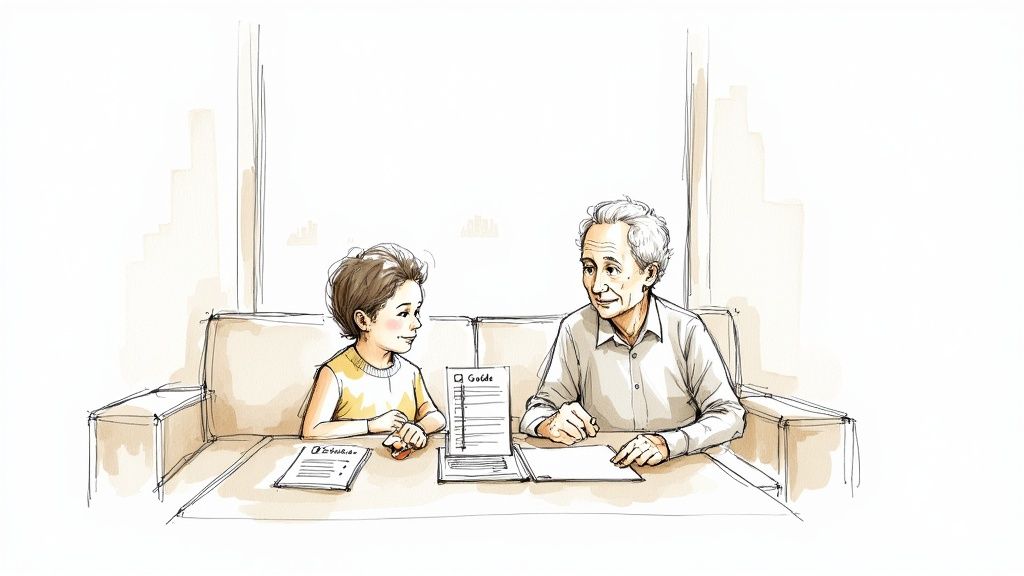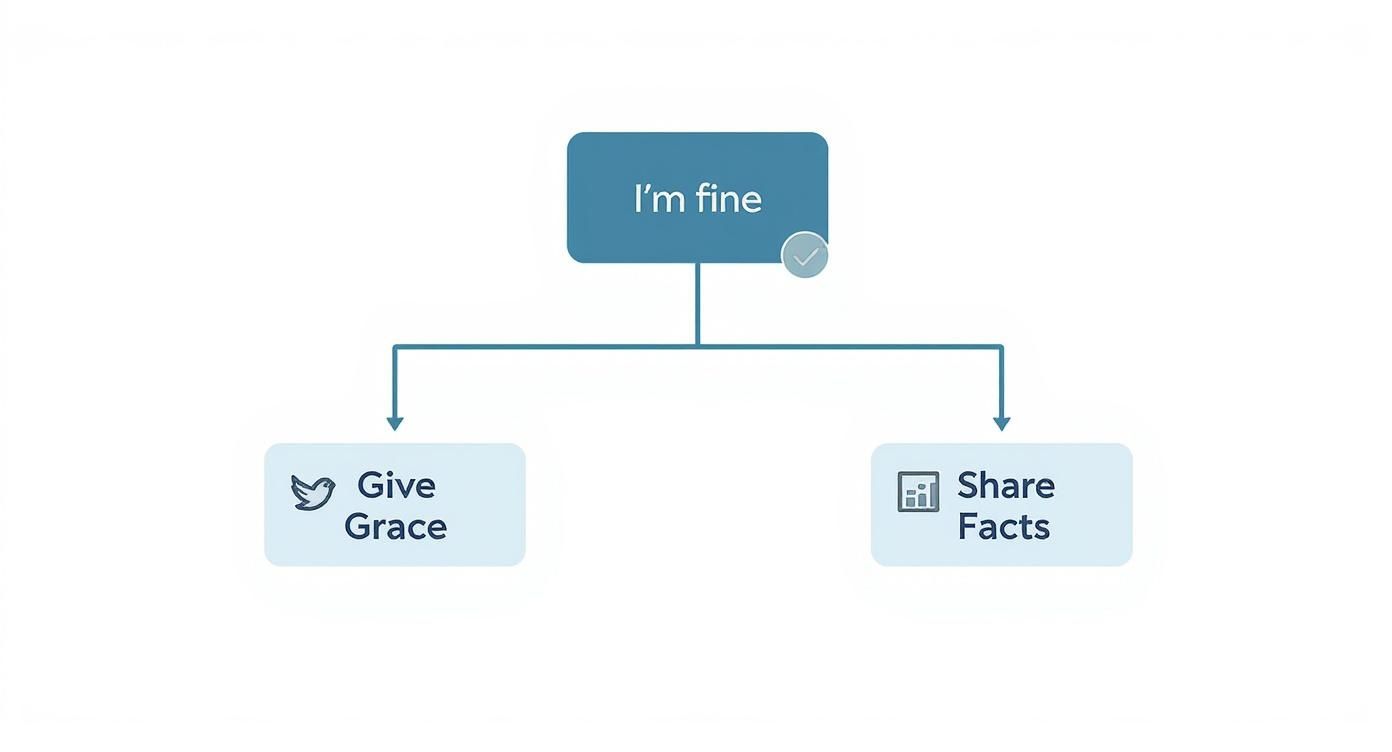How to Talk to Parents About Assisted Living in Cleveland
Broaching the topic of assisted living with your parents isn't a single event; it's a series of gentle conversations. For families in Greater Cleveland, the key is to start early and frame the discussion around safety, well-being, and a better social life—not just a move. This guide helps turn a stressful, abstract idea into a concrete, local plan.
-
Who this helps: Families in Cuyahoga, Lake, Lorain, Geauga, Medina, and Summit counties who are concerned about a parent's ability to live safely and independently at home.
-
Key takeaways: The best conversations start before a crisis, focus on your parent's fears and desires, and present assisted living as a way to gain independence and support, not lose it. Preparing with local information and a united family front is crucial.
-
TL;DR: The 5-Step Approach
-
Observe First: Gently note specific signs your parent needs more support (e.g., struggling with home maintenance, increased isolation, minor falls). Don't judge, just observe.
-
Unite the Family: Talk with siblings before approaching your parent to ensure you present a united, supportive front.
-
Do Your Homework: Gather key documents (Power of Attorney, LTC insurance) and research 2-3 specific Cleveland-area communities to make the idea real and positive.
-
Talk with Empathy: Start conversations with "I feel..." or "I'm worried about..." to avoid sounding accusatory. Listen more than you talk.
-
Explore, Don't Push: Suggest a low-pressure visit, like having lunch at a local community, instead of a formal "tour."
Recognizing When It’s Time for a Change

The realization that a parent might need more support is rarely a single moment. It’s a series of small, quiet changes you might initially brush off. Learning how to talk to your parents about assisted living starts with recognizing these shifts not as failures, but as openings for a conversation.
For families in Northeast Ohio, these signs are often tied to our way of life. A father in Medina who once managed icy driveways without issue now seems stressed by winter storm forecasts. A mother in Lakewood, once active in her community, now stays home more, finding it harder to get out. These are signals that their current home might be causing more worry than comfort.
Observing Changes Without Judgment
Your role is to be a loving observer, not a critic. Keep a private journal of specific things you notice, with dates. This isn't to build a case but to help you see patterns over time, grounding your conversation in love and genuine concern.
- Example: A specific observation like, "Dad, I noticed the gutters are overflowing again, and I really worry about you getting up on that ladder," lands much softer than a vague statement like, "You're not taking care of the house anymore."
According to the U.S. Department of Health and Human Services, a person turning 65 today has almost a 70% chance of needing some type of long-term care services in their remaining years. Planning ahead is a loving, proactive step. You can find more data on long-term care needs for seniors from official sources.
Checklist: Observable Signs a Conversation Is Needed
This is not a medical tool but a guide to help pinpoint areas where your parent might benefit from more support.
| Category | What to Look For | Why It Matters for Their Safety |
| :--- | :--- | :--- |
| Physical Health | Unexplained weight loss, poor balance, difficulty rising from a chair, new bruises. | These can be early signs of mobility issues, malnutrition, or unreported falls, increasing the risk of serious injury. |
| Cognitive Health | Forgetting appointments, repeating stories, confusion with finances, poor judgment. | These changes could signal cognitive decline, making them vulnerable to financial scams or medication errors. |
| Social & Emotional | Increased isolation, loss of interest in hobbies, noticeable changes in mood. | Loneliness can have a significant negative impact on both mental and physical health. |
| Home Environment | Clutter, expired food in the fridge, neglected yard, difficulty with basic home maintenance. | An unsafe or unkempt home can lead to falls, illness, and unnecessary stress. |
If you see a few things on this list, it’s a gentle, fact-based starting point for one of the most important conversations you’ll have.
Your Pre-Conversation Cleveland Playbook

A productive conversation about assisted living rarely happens spontaneously. It requires thoughtful preparation so you can enter the discussion feeling calm, informed, and confident. This playbook helps you get organized before you say a word.
Step 1: Align the Family First
Before approaching your parent, it is critical to get on the same page with siblings or other key family members. Presenting a divided front causes confusion and can make your parent feel trapped.
Schedule a private call or meeting. The goal isn't to gang up on them; it's to form a united, supportive team. Share specific observations. One sibling might be concerned about medication mix-ups, while another has noticed they seem lonely. Pooling these observations creates a clearer, more objective picture.
What this means for you: A united front sends a powerful message of shared love and concern. It changes the dynamic from "one child is worried" to "we, as a family, want to make a plan with you for the future."
Step 2: Gather Financial and Legal Documents
Walking into this conversation without understanding the financial landscape is a mistake. You need to do your homework to answer the inevitable question: "How can we pay for this?"
This step requires sensitivity. You aren't prying; you are trying to understand what resources are available. Frame the request gently: "Mom, as we plan for the future, it would help me understand your financial picture so we can make sure you're always protected."
-
Legal Documents: Locate a Power of Attorney (POA) for both healthcare and finances, a will or trust, and especially any Long-Term Care (LTC) insurance policies.
-
Financial Overview: Get a general sense of monthly income (Social Security, pensions), savings, and major assets like a home. This is key to understanding affordability.
Step 3: Research Ohio-Specific Support and Local Communities
This is where you can turn an abstract idea into an attractive, real-world option. Instead of just saying "assisted living," you can say, "I found a beautiful community in Lakewood just ten minutes from the grandkids that has a garden club."
Start by researching two or three specific Assisted Living (officially known as Residential Care Facilities in Ohio) communities in their desired area. Focus on features that align with your parent's personality.
This is also the time to learn about Ohio-specific financial aid. A key program is the Medicaid Assisted Living Waiver (AL Waiver). In Ohio, this program helps income-eligible seniors pay for the care services they receive in an assisted living community, though it doesn't cover room and board. You can check the current eligibility requirements on the Ohio Department of Aging website.
Navigating the Conversation with Empathy and Respect
There's no magic script that makes this conversation easy. The goal is to have a real, heart-to-heart dialogue that honors your parent’s feelings while making your love and concern clear. Frame the discussion around planning and empowerment, not loss.
Start with "I," Not "You"
One of the most powerful shifts you can make is to start sentences with "I feel" or "I'm worried about..." This moves the conversation away from what they might be doing "wrong" and centers it on your own feelings.
-
Instead of: "You have to stop climbing that ladder."
-
Try: "Mom, my heart just stops when I see you on that ladder cleaning the gutters. It would give me so much peace of mind if we could find a solution where you never had to worry about that again."
Here are a few more examples grounded in Northeast Ohio life:
-
"Dad, I keep thinking about that brutal snow we got in Geauga County last winter. I really worry about you out there shoveling that huge driveway all alone."
-
"I know how much you love your house in Parma, but I feel concerned that it's getting a little lonely now that so many of your old neighbors have moved."
Handling Common Pushback
Resistance is normal. It often comes from fear of losing independence. Your job is not to win an argument but to hear the fear behind their words and respond with compassion and facts.
"I'm perfectly fine. I don't need any help."
- What to say: "I know you are. You're incredibly independent, and I admire that. My worry isn't about today. It's about making sure we have a plan for the 'what-ifs.' Having extra support nearby could actually help you stay independent even longer."
"We can't afford that. It's too expensive."
- What to say: "That's a completely fair point, and something I've looked into. There are many options at different price points. I even found information on programs like the Ohio AL Waiver that can help with care costs. Could we maybe just look at some numbers together? No pressure at all."
A Tale of Two Conversations
The empathetic path focuses on shared goals, uses respectful language, and keeps your parent in the driver's seat. This is a conversation you have with them, not at them.
| The Confrontational Approach ❌ | The Empathetic Approach ✅ |
| :--- | :--- |
| "Mom, this house is too much for you. We need to talk about putting you in a home." (Alarming, judgmental language) | "Mom, I was thinking about how much work this big house is. I wonder if there’s a way for you to have all the freedom you love, but with less of the stress of repairs and yard work." (Frames it around a shared problem and a positive goal) |
| "You're forgetting things, and it's not safe for you to be alone anymore." (Feels like a direct, hurtful attack) | "I would feel so much better knowing you had people around and support nearby, just in case. It's really about peace of mind for both of us." (Focuses on your feelings and a mutual benefit) |
| "Assisted living is the only option. We have to do this." (An ultimatum that removes your parent's control) | "I found a few interesting places over in Lorain County with beautiful apartments. Would you be open to just going for lunch with me at one? Just to see what it's like." (Offers a small, low-pressure next step) |
Exploring Cleveland Communities and Easing the Move
Once you’ve opened the door to the conversation, it's time to shift from talking to exploring. The key is to keep it low-pressure. Think of it less as an inspection and more as a casual outing to gather information.
Making Tours a Positive Experience
Frame visits as casual explorations to help your parent feel in control.
-
The Lunch Date: "Hey Dad, I heard this community over in Mentor has a fantastic dining room. How about we grab lunch there next week and just check the place out?"
-
The Friend of a Friend: "Mom, remember you mentioned Carol’s mother moved into that place in Westlake? She seems to love it. I thought we could just swing by and pick up a brochure."
During the visit, observe how staff interacts with residents. Do they seem genuinely engaged? Do residents look happy and active? For a comprehensive guide, our senior living tour checklist is a great resource.
Navigating the Downsizing Process
Downsizing a lifetime of possessions is often more emotional than physical. Give your parent time to sort through their belongings and share stories.
Start small, tackling one room at a time. For larger items or keepsakes that won’t fit, learning how self-storage can simplify the moving process can be a lifesaver.
Making Their New Apartment Feel Like Home
The goal is to make their new space feel familiar from day one. Get a floor plan of the new apartment beforehand to measure favorite furniture pieces.
Checklist for Personalizing Their New Space:
-
Familiar Furniture: Bring key pieces like a cherished armchair, bookshelf, or nightstand.
-
Wall Decor: Hang family photos and favorite prints right away.
-
Comfort Items: Have their favorite bedding, a comfy throw blanket, and go-to coffee mug ready.
-
Technology & Entertainment: Set up the TV to their favorite channels and connect their tablet to Wi-Fi.
This decision tree gives a simple way to respond to resistance by balancing empathy with gentle, factual information.

This transition is an emotional journey for everyone. Acknowledge all feelings—relief, sadness, and excitement. The goal is to celebrate the new chapter this move represents: one of safety, community, and well-deserved peace of mind.
What to Do Next
Talking is the first step, but taking action is what matters. Here is a simple, manageable plan for families in Northeast Ohio.
-
Contact the Western Reserve Area Agency on Aging. This is the official, unbiased resource for Cuyahoga, Geauga, Lake, Lorain, and Medina counties. They can provide a needs assessment to help clarify the right level of care and connect you with local programs.
-
Schedule a "Lunch and Look." Instead of a formal "tour," call a promising community and ask to schedule a casual lunch. It's a low-pressure way for your parent to experience the atmosphere, taste the food, and see the community in action.
-
Use the Ohio Long-Term Care Consumer Guide. This official tool from the Ohio Department of Aging lets you compare licensed facilities based on their state inspection reports and resident satisfaction scores.
-
Report a Concern or Talk to the Ombudsman. If you have safety or rights concerns about any facility, you can contact the Ohio Long-Term Care Ombudsman Program for confidential advocacy.
For those helping a parent move from out of state, resources like a Jacksonville to Cleveland movers relocation guide can help with logistics.
What this means for you: Taking small, informed steps turns an overwhelming task into achievable goals. Each call and visit brings more clarity and moves your family closer to a solution that provides true peace of mind.
To understand Ohio-specific financial options better, read our guide on the Medicaid Assisted Living Waiver in our detailed guide.
Disclaimer: This article is for informational purposes only and does not constitute legal, financial, or medical advice. Please consult with a licensed professional for guidance specific to your situation.
#
<!-- FAQ rendered separately -->Need Help Finding Senior Living in Greater Cleveland?
Our Greater Cleveland local advisors can provide personalized recommendations, schedule tours, and answer all your questions—completely free.